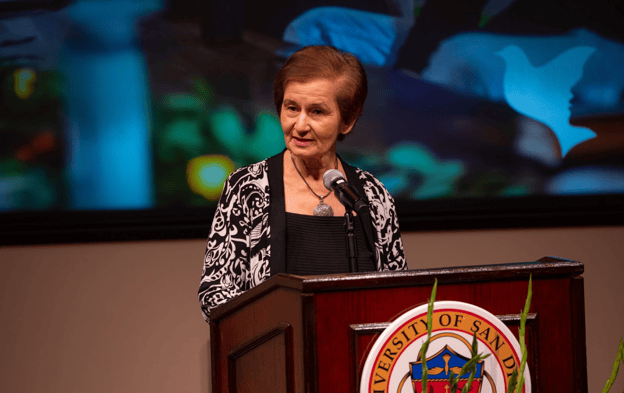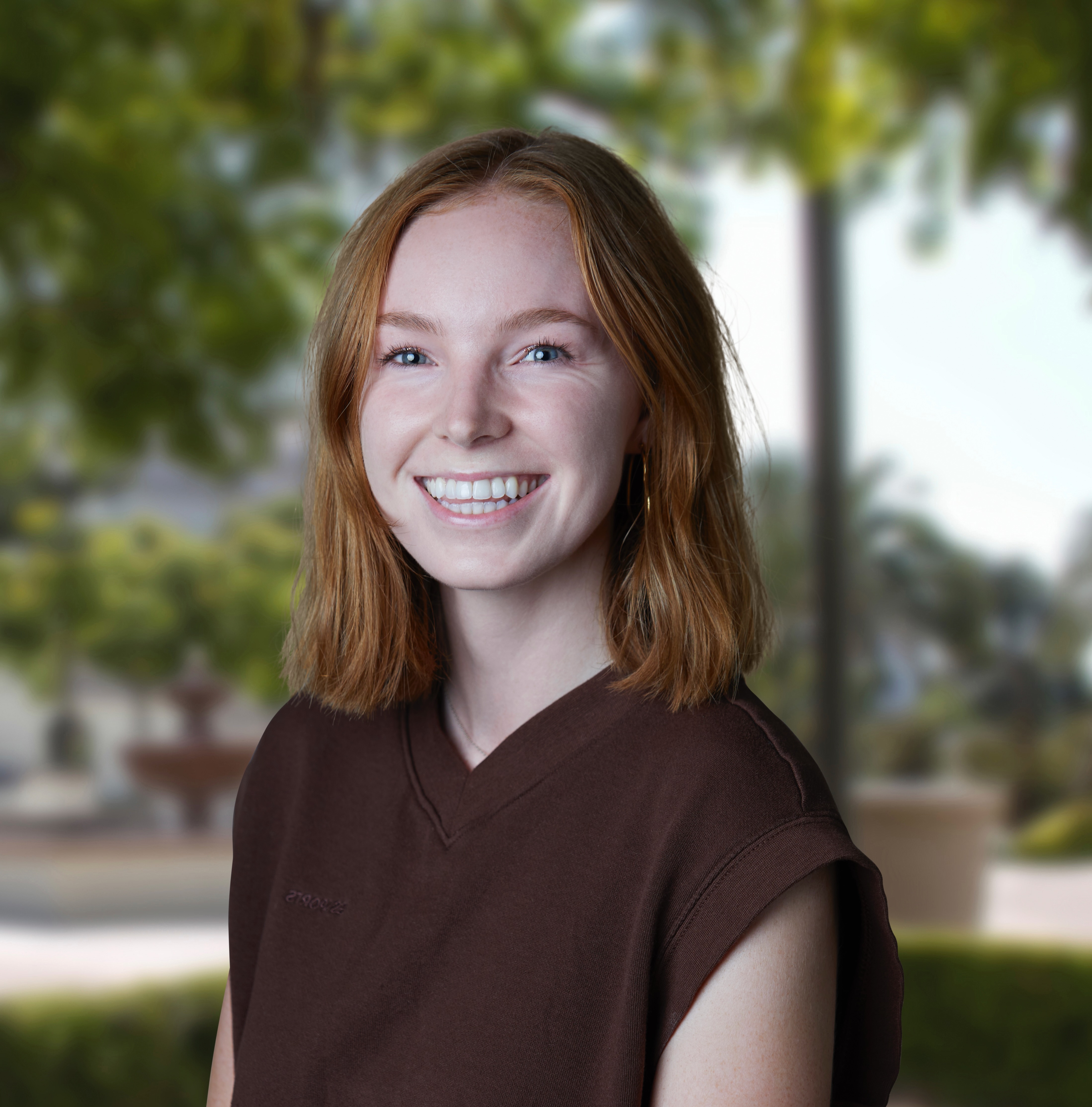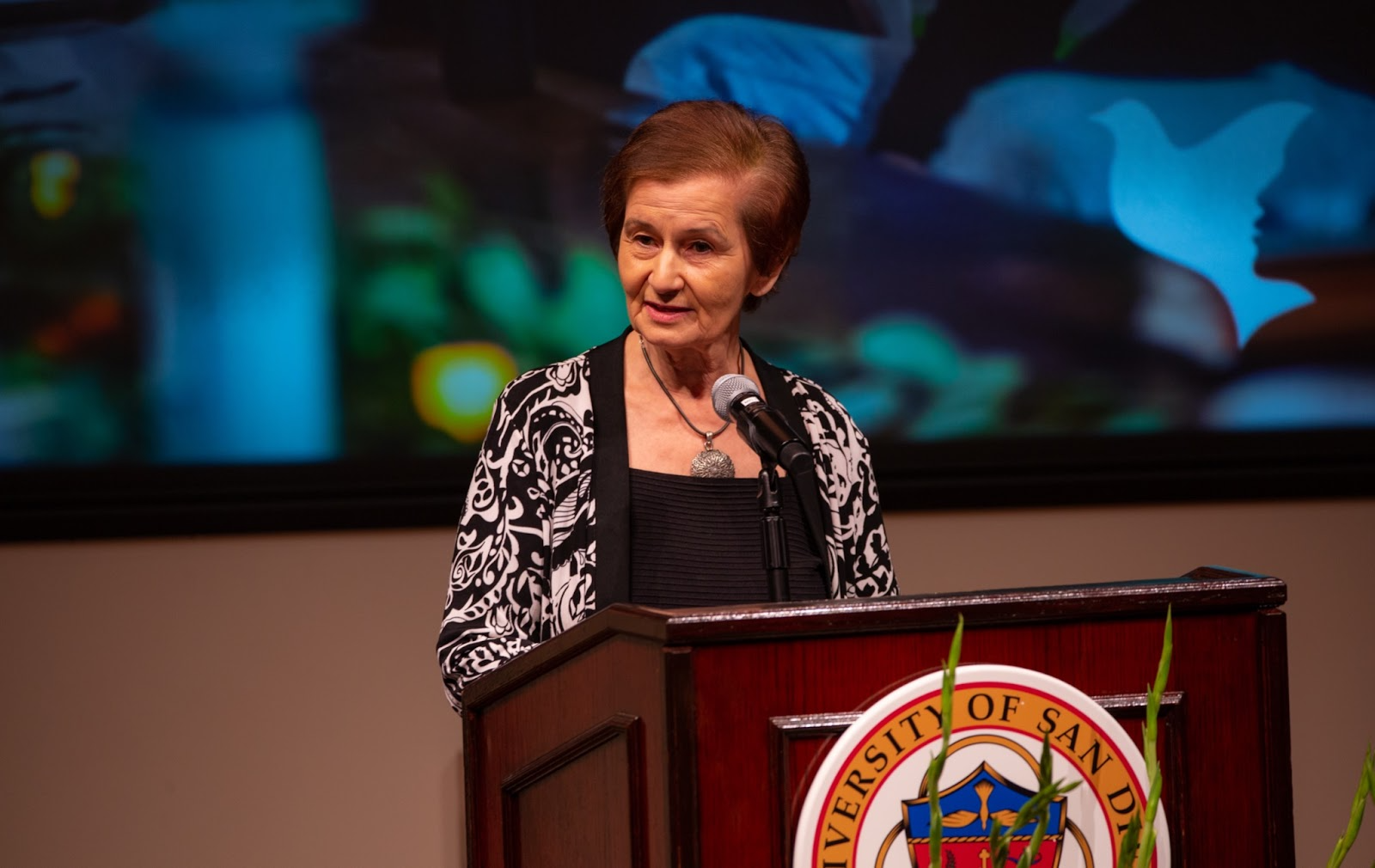About a week into the Women PeaceMakers’ residency at the Kroc School this past December 2022, the Fellows were asked what they wanted more of in their schedule. Their answer? More time with Dr. Tschirgi. After speaking one-on-one with her over a coffee at La Paloma, I could see why, as she is chock full of stories, wisdom, and a listening ear.

Dr. Tschirgi opening the 2022-2023 annual Women PeaceMakers event.
Before joining the Kroc School in 2010, Necla Tschirgi built an extensive international peacebuilding career spanning research, grantmaking, and policy analysis, and worked primarily at the intersection of development and security in places such as the UN Peacebuilding Support Office and the International Peace Academy in New York City. Dr. Tschirgi is something of a Kroc School giant–she’s been instrumental in the evolution of the Kroc School and in advocating for the Women PeaceMakers (WPM) program, which is housed at the Kroc Institute for Peace and Justice (Kroc IPJ).
Established in 2002, the Women PeaceMakers program is now one of the cornerstones of the Women, Peace and Security initiative in the Kroc IPJ. The program is a year-long fellowship that brings together women peacebuilders from conflict-affected communities to conduct applied research for mutual learning, to build more effective partnerships, and to strengthen peacebuilding practice and policy. The Women PeaceMakers engage with USD students, faculty, and staff and with members of the San Diego community during their two-week residency in the fall.
When I first reached out, Dr. Tschirgi leapt at the opportunity to reflect on the Women PeaceMakers program with me. In true professor style, she began our conversation with a context and history of the program. “When the Kroc School was still very young, the Women PeaceMakers program was the jewel in the crown and was well-known and appreciated on campus and in the community. Bringing many impressive women from places like Afghanistan, Tanzania, Israel, and Colombia, the program was exciting and stimulating for students and community members alike. It attracted students particularly due to its proximity to peacebuilding practitioners.” According to Briana Mawby, Program Officer for Women, Peace and Security, “The Women PeaceMaker Fellows have benefitted deeply from Dr. Tschirgi’s kindness and hospitality, and she built long-lasting relationships with many of them. She has provided invaluable guidance and support to the program.”
The Women PeaceMakers program has continued to be an integral piece of Kroc School learning, including through the War, Gender, and Peacebuilding class, which was originally taught by Jennifer Freeman, who led the Kroc IPJ’s Women PeaceMakers program from 2010 through 2020. Dr. Tschirgi took leadership of the class in 2021. She faced logistical challenges and uncertainty, since the pandemic led her to teach online and without the presence of the Women PeaceMakers. She had to be innovative to build on the strengths of the Fellows to create a curriculum that would give students an understanding of the interlinkages of theory and practice despite the pandemic restrictions. Nevertheless, she noted how wonderful the cohort of Fellows was, bringing unique perspectives to the class.
Dr. Tschirgi transformed the class into an engaging and stimulating learning opportunity, where students worked with the four Women PeaceMakers individually via Zoom, and produced an hour-long video for the class about each Fellow and her particular context. Throughout the semester, the students remained in touch with the Women Peacemakers; in fact, Dr. Tschirgi told me the Women PeaceMakers reported that the highlight of their fellowship was the interaction with the students, “because the students were so curious, so engaged, and so connected to their peacemaker.” The students also enjoyed the experience. Cassie Barrett, a second-year Kroc School student said, “Professor Tschirgi always encouraged students to problematize a situation and think critically about why and how the dynamics and institutions that we see today are operating as they are. Tschirgi also had incredible guest speakers, and made sure to highlight and elaborate upon key treaties and documents for women's rights, such as CEDAW [the Convention on the Elimination of All Forms of Discrimination Against Women], throughout the course. I am grateful for all the knowledge she shared throughout her time with Kroc.”
Dr. Tschirgi emphasized the importance of teaching Kroc School students about the gendered impacts of violence, noting, “Don’t take it for granted that [Women, Peace, and Security] is an issue that is well integrated and well accepted. There are still major barriers and hurdles, such as the Taliban on one hand and the state of US reproductive rights on the other hand. [Gender] is a central issue in this field, and the IPJ and Kroc School must invest in the next generation.”
Dr. Tschirgi has remained a strong supporter of the WPM program, engaging with the Fellows, constantly looking for ways to integrate the program into the life of the Kroc School, including supporting the completion of a study summarizing lessons learned from the program. Jennifer Freeman said, “Dr. Necla Tschirgi was an ally and supporter of the Women PeaceMakers program from day one. She recognized the unique asset the program offered to the Kroc School, and USD, and advocated for the Women PeaceMakers…In her role as Editor for the Journal for Development and Peacebuilding, she encouraged the submission of the first peer-reviewed journal article on the Women PeaceMakers' peacebuilding strategies, which went on to become one of the most accessed and read articles in the journal's archives.”
Heeding Women’s Voices: Breaking Cycles of Conflict and Deepening the Concept of Peacebuilding highlights the gap between institutional peacebuilding, which narrowly focuses on formal efforts in conflict or post-conflict circumstances, and the lived experiences of grassroots peacebuilders. The study proposes peacebuilding is much more than the formal and institutional level peace processes, but also involves horizontal peacebuilding, or the personal, relational work that builds trust and positively impacts the everyday lives of those in communities experiencing violence. These acts are often done by women–yet they remain in the dark, with very little funding or support. Dr. Tschirgi recognized that it was important for the decade-old Women PeaceMakers Program to reflect on its larger contribution, and she was delighted that her colleagues took the opportunity to publish their article in the Journal of Peacebuilding and Development.
When I asked what she liked most about the Women PeaceMakers program, Dr. Tschirgi said, “Our understanding of peacebuilding has expanded over the last 30 years [that I've been involved]. This is reflected in the work of the Women PeaceMakers who come to USD. There is mutual learning–that’s why it is important to bring them to campus and into the classroom and to expose them to the students.”
By leading the War, Gender, and Peacebuilding course despite the pandemic, encouraging the article on lessons learned, and constantly looking at ways to integrate the WPM program into the Kroc School, Dr. Tschirgi leaves a legacy of allyship and support for the Women PeaceMakers program and its agenda to highlight, learn from, and celebrate the voices and experiences of women peace leaders. Jennifer Freeman said, “Dr. Tschirgi's support for the program over the years was instrumental in articulating the value of the fellowship to the university, and ensuring the Women PeaceMakers' work could enhance Kroc School students' studies of the practical application of Peace Studies at USD." Whether through research, teaching, or outreach, the Women PeaceMakers program has benefited and grown as a result of Dr. Tschirgi’s unwavering belief in its value and impact for students, the San Diego community, and the world.

About the Author






